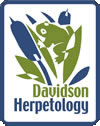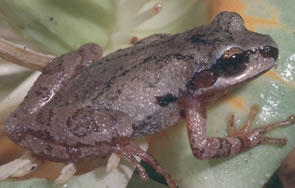
Mountain Chorus Frog
Pseudacris brachyphona
Photo by RW Van Devender
Listed: State, Special Concern.
Description: The mountain chorus frog is a small, stocky frog, usually brown or gray, with a prominent stripe running from the eye to the groin on each side of the body. The stripes bend inward to form two crescents; in some individuals, they meet in the middle of the back to form an “X.” Like most other chorus frogs, this species has a white line above its lip and a dark triangular spot between the eyes.
Habitats and Habits: Very little is known about mountain chorus frogs in North Carolina. They are found in the extreme southwestern corner of the state, where they have been documented from only a few sites in Cherokee County. Breeding occurs in hillside streams, shallow ponds and ditches. Eggs are laid in masses of 10 to 50 and are attached to grasses, twigs and leaves. The tadpole stage lasts about eight weeks.
Call: Mountain chorus frogs call from February to April. Their breeding call is a raspy “wreenk,” and is somewhat similar to the call of upland chorus frogs, but it is given more rapidly and is higher pitched.
Frog Fact: The mountain chorus frog was once thought to have disappeared from North Carolina; it was not reported between 1954 and 2001, but was “rediscovered” in 2001.
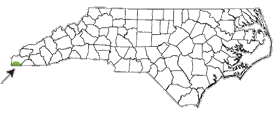
The shaded region represents the range of the mountain chorus frog in North Carolina.
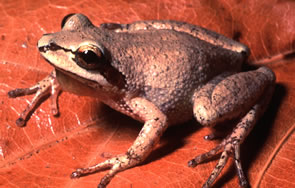
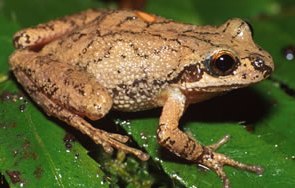
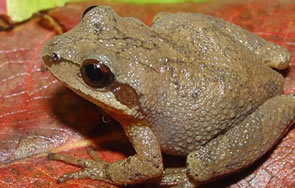
Photo by RW Van Devender
Photo by Aubrey M. Heupel
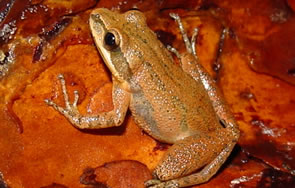
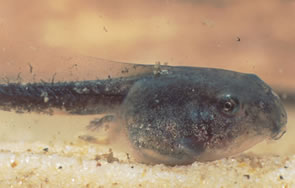
Photo by RW Van Devender
This website created by: Grant Connette and Evan Eskew.
For comments or questions contact M. Dorcas: midorcas@davidson.edu.
M. Dorcas homepage: http://bio.davidson.edu/dorcas
Davidson College, Davidson, North Carolina 28035-1719.
Text and maps from: Dorcas, M. E., S. J. Price, J. C Beane, and S. S. Cross. 2007. The Frogs and Toads of North Carolina. North Carolina Wildlife Resources Commission, Raleigh, NC. – Copyright by Michael E. Dorcas
Call provided by Walter Knapp.
Partial Funding for this website provided by a Associate Colleges of the South, National Science Foundation, and Duke Energy.
